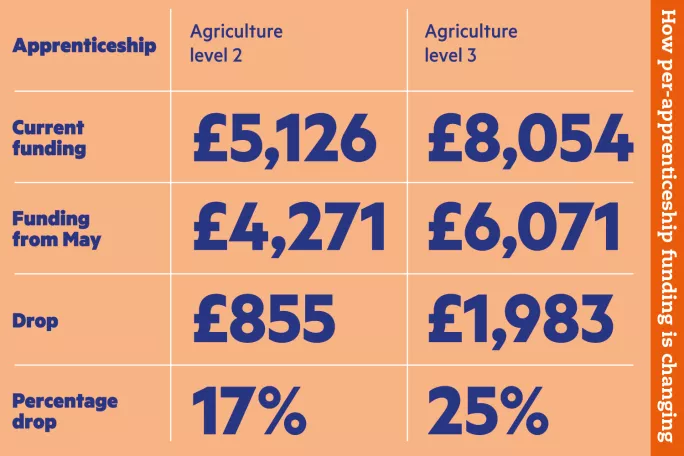Farming apprenticeships at risk amid funding cuts

Swathes of agricultural apprenticeships could be scrapped because funding changes threaten to make them financially unviable, land-based colleges have warned.
Landex, the umbrella body for land-based colleges, has told TES that, even with the transitional protection for 16-18 apprentices that was announced in October, funding for agriculture apprenticeships will drop by as much as a quarter in May.
This is a major risk to the government in hitting its apprenticeship targets
Overall, the funding for 16-18 learners following land-based apprenticeships will be reduced by an average of 20 per cent, according to Landex, with the figure even higher for those following agriculture and land-based engineering at level 3.
Chris Moody, Landex chief executive, said that if businesses retained the £1,000 allocated as an “employer incentive” for each apprenticeship, the funding that colleges received for delivery and assessment would drop by around 40 per cent on average.
Colleges have said that they face losing huge sums of money as a result of the changes, which will make some provision unsustainable.
The new funding methodology does not recognise the specialist and high-cost nature of land-based provision for 16-18 learners, according to Landex.
“Most land-based employment is in micro-businesses, where lone working in potentially dangerous environments and with large machinery and animals is commonplace,” the organisation said in a statement. “In the agriculture industry, serious injuries and fatalities are currently eight times as high, per head of workforce, as they are in the construction industry. Consequently, much of the initial experience within an apprenticeship must be delivered off-site under close supervision by a college or other provider.”
This, Landex explained, is “inevitably high-cost and, unless apprenticeship frameworks are appropriately funded, it is unlikely that numbers will be maintained or expanded to meet current government targets”.
One-year programmes
As a result, TES understands that some colleges are considering scrapping level 2 apprenticeships and instead offering one-year, full-time programmes including an extended period of work experience.
Meredydd David, principal of Reaseheath College in Cheshire, said that the institution stood to lose around £400,000 in funding.
“This makes apprenticeship delivery, especially in these areas, financially unviable as it would make a significant loss,” he added. “A reduction in the funding of this magnitude will mean that we will not be able to deliver the quality expected and needed by industry, and we will therefore have to seriously consider not enrolling apprentices at this rate and will find alternative programmes and funding routes for them. This is a major risk to the government in hitting its [3 million apprenticeships by 2020] target as well.”
Landex is calling for all land-based apprenticeships to be classed as Stem (science, technology, engineering and maths) provision, which would mean they would be eligible for additional funding. Land-based subjects at level 4 and above are recognised as Stem subjects by higher education funding body Hefce, the organisation added.
Mr Moody said: “If the Institute for Apprenticeships wishes to maximise the promotion and uptake of land-based apprenticeships and aid recruitment to the sector, the most appropriate solution will be to acknowledge the status of land-based disciplines as Stem subjects with the associated allocation of funding.”

Ann Turner, principal of Myerscough College in Lancashire, one of the largest providers of land-based apprenticeships, said she was “concerned about the impact that funding reductions could have on the viability of some programmes and the consequential impact on the desired growth in high-quality apprenticeships nationally”.
“It is essential to maintain apprenticeship provision with embedded qualifications so they remain beneficial to both the apprentice and the employer,” she added.
“The recognition of land-based apprenticeships as Stem subjects would go some way to easing this problem.”
According to Landex, another provider, which currently supports 99 agriculture apprentices, faces a reduction of more than £207,000 in funding this year.
A spokesman for the Department for Education said: “We recognise the importance of agriculture and horticulture subjects, and under our new funding plans, we are moving to a simplified single funding rate for frameworks. In addition we will offer an extra 20 per cent of funding to providers where they train a 16- to 18-year-old.
“Apprenticeships increase the country’s skills base and give millions of young people a step on the ladder of opportunity. Thanks to the levy, £2.5 billion will be invested in apprenticeships by 2019-20 - double the amount spent in 2010-11.”
You need a Tes subscription to read this article
Subscribe now to read this article and get other subscriber-only content:
- Unlimited access to all Tes magazine content
- Exclusive subscriber-only stories
- Award-winning email newsletters
Already a subscriber? Log in
You need a subscription to read this article
Subscribe now to read this article and get other subscriber-only content, including:
- Unlimited access to all Tes magazine content
- Exclusive subscriber-only stories
- Award-winning email newsletters